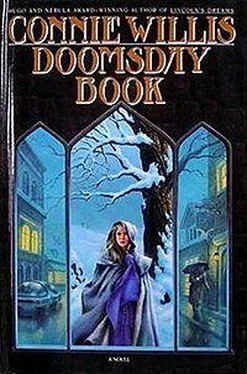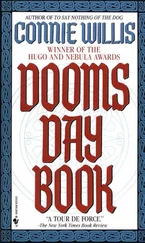"Mr. Dunworthy!" Colin shouted, coming at a dead run, and he looked up blindly, helplessly at him.
"What's happened ?" Colin said accusingly. "Did you find her?"
"No," he said, blocking Colin's way. We're not going to find her.
Colin was looking past him at the woman. Her face was bluish-white against the white snow, the bright blue dress. "You found her, didn't you? Is that her?"
"No," Dunworthy said. But it could be. It could be. And I can not turn over any more bodies, thinking it might be. His knees felt watery, as though they would not support him. "Help me back to the shed," he said.
Colin stood stubbornly where he was. "If it's her, you can tell me. I can bear it."
But I can't, Dunworthy thought. I can't bear it if she's dead.
He started back towards the steward's house, keeping one hand on the cold stone wall of the church and wondering what he would do when he came to open space.
Colin leaped beside him, taking his arm, looking anxiously at him. "What's the matter? Are you having a relapse?"
"I just need to rest a bit," he said and went on, almost without meaning to, "Kivrin wore a blue dress when she went." When she went, when she lay down on the ground and closed her eyes, helpless and trusting, and disappeared forever into this chamber of horrors.
Colin pushed the door of the shed open and helped Dunworthy inside, holding him up with both hands on his arm. The stallion looked up from a sack of oats.
"I couldn't find any hay," Colin said, "so I gave it some grain. Horses eat grain, don't they?"
"Yes," Dunworthy said, leaning into the sacks. "Don't let him eat them all. He'll gorge himself and burst."
Colin went over to the sack and began dragging it out of the stallion's reach. "Why did you think it was Kivrin?" he said.
"I saw the blue dress," Dunworthy said. "Kivrin wore a dress that color."
The bag was too heavy for Colin. He yanked on it with both hands, and the side split, spilling oats on the straw. The stallion nibbled eagerly at them. "No, I mean all those people died of the plague, didn't they? And she's been immunized. So she couldn't get the plague. And what else would she die of?"
Of this, Dunworthy thought. Noone could have lived through this, watching children and infants die like animals, piling them in pits and shoveling dirt over them, dragging them along with a rope around their dead necks. How could she have survived this?
Colin had maneuvered the sack out of reach. He let it fall next to a small chest and came over and stood in front of Dunworthy, a little breathless. "Are you sure you're not having a relapse?"
"No," he said, but he was already beginning to shiver.
"Perhaps you're just tired," Colin said. "You rest, and I'll be back in a moment."
He went out, pushing the shed's door shut behind him. The stallion was nibbling the oats Colin had spilled, taking noisy, chomping bites. Dunworthy stood up, holding to the rough beam, and went over to the little casket. The brass bindings had tarnished and the leather on the lid had a small gouge in it, but otherwise it looked brand-new.
He sat down beside it and opened the lid. The steward had used it for his tools. There was a coil of leather rope in it and a rusty mattock head. The blue cloth lining Gilchrist had talked about in the pub was torn where the mattock had lain against it.
Colin came back in, carrying the bucket. "I brought you some water," he said. "I got it out of the stream." He set the bucket down and fumbled in his pockets for a bottle. "I've only got ten aspirin, so you can't have much of a relapse. I stole them from Mr. Finch."
He shook two into his hands. "I stole some synthomycin, too, but I was afraid it hadn't been invented yet. I figured they had to have had aspirin." He handed the aspirin tablets to Dunworthy and brought the bucket over. "You'll have to use your hand. I thought the contemps' bowls and things were probably full of plague germs."
Dunworthy swallowed the aspirin and scooped a handful of water out of the bucket to wash it down. "Colin," he said.
Colin took the bucket over to the stallion. "I don't think this is the right village. I went in the church and the only tomb in there was of some lady." He pulled the map and the locator out of another pocket. "We're still too far east. I think we're here," he pointed at one of Montoya's notes, "so if we go back to that other road and then cut straight east — "
"We're going back to the drop," he said. He stood up carefully, not touching the wall or the trunk.
"Why? Badri said we had a day at least, and we've only checked one village. There are lots of villages. She could be in any of them."
Dunworthy untied the stallion.
"I could take the horse and go look for her," Colin said. "I could ride really fast and look in all these villages and then come back and tell you as soon as I find her. Or we could split up the villages and each take half, and whoever finds her first could send some kind of signal. We could light a fire or something and then the other one would see it and come."
"She's dead, Colin. We're not going to find her."
"Don't say that!" Colin said, and his voice sounded high and childish. "She isn't dead! She had her inoculations!"
Dunworthy pointed at the leather casket. "This is the casket she brought through."
"Well, what if it is?" Colin said. "There could be lots of chests like it. Or she could have run away, when the plague came. We can't go back and just leave her here! What if it was me that was lost and I waited and waited for somebody to come and nobody did?" His nose had begun to run.
"Colin," Dunworthy said helplessly, "sometimes you do everything you can, and you still can't save them."
"Like Great-Aunt Mary," Colin said. He swiped at his tears with the back of his hand. "But not always."
Always, Dunworthy thought. "No," he said. "Not always."
"Sometimes you can save them," Colin said stubbornly.
"Yes," he said. "All right." He tied the stallion up again. "We'll go and look for her. Give me two more aspirin, and let me rest a bit till they take effect, and we'll go and look for her."
"Apocalyptic," Colin said. He grabbed the bucket away from the stallion, who had gone back to slurping it. "I'll fetch some more water."
He went running out, and Dunworthy eased himself to sitting against the wall. "Please," he said. "Please let us find her."
The door opened slowly. Colin, standing in the light, was outlined in radiance. "Did you hear it?" he demanded. "Listen."
It was a faint sound, muffled by the walls of the shed. And there was a long pause between peals, but he could hear it. He stood up and went outside.
"It's coming from over there," Colin said, pointing toward the southwest.
"Get the stallion," Dunworthy said.
"Are you certain it's Kivrin?" Colin said. "It's the wrong direction."
"It's Kivrin," he said.
The bell stopped before they even got the stallion saddled. "Hurry!" Dunworthy said, cinching the girth strap.
"It's all right," Colin said, looking at the map. "It rang three times. I've got a fix on it. It's due southwest, right? And this is Henefelde, right?" He held it in front of Dunworthy, pointing to each place in turn. "Then it's got to be this village here."
Dunworthy glanced at it and then toward the southwest again, trying to keep the direction of the bell clear in his mind. He was already unsure of it, though he could still feel the throbbing of its tolling. He wished the aspirin would take effect soon.
"Come on, then," Colin said, pulling the stallion over to the door of the shed. "Get on, and let's go."
Dunworthy put his foot in the stirrup and swung the other leg over. He was instantly dizzy. Colin looked speculatively at him, and then said, "I think I'd better drive," and swung himself up in front of Dunworthy.
Читать дальше












